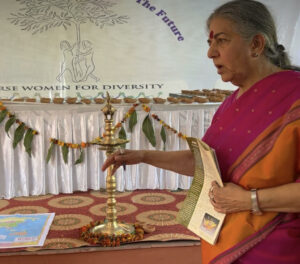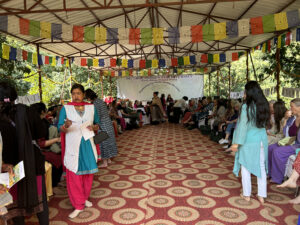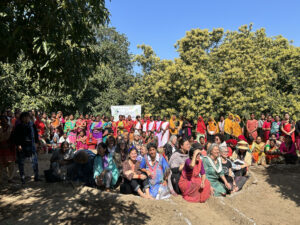Executive Summary
Diverse women from all walks of life are creating a new solidarity, showing that women-led cultures have long existed on this Earth in peace. At the 1996 World Food Summit the DWD declared in the face of industrial agribusiness that food sovereignty must be kept in women’s hands – that they were creating unnecessary disease, hunger and ecological destruction. Coming from all over the world, the Diverse Women For Diversity movement has continued to gather and share the belief that differences, contexts, the variety of voices, and the variety of ways that they express care, are key to resisting the imposition of industrial uniformity. It is diverse cultures that will lead the way to the future.

In March 2023, the DWD gathered at the Navdanya Biodiversity Conservation Farm in Dehradun, India to celebrate the unique and rich diversity of life, cultures, food and knowledge, to share the struggles, victories, and actions in defense of the Earth, biodiversity, and food. Over 150 women gathered, from more than 20 countries, from 21 states of India, Latin America, North America, Europe, Japan, Africa, and Australia, among many others. There were farmers, bakers, poets, archivists, indigenous leaders, travelers, fisherwomen, archaeologists, gift economists, geneticists, academics, doctors, mothers, and more.
There were women in their twenties and women in their eighties. Sacred Mother Earth was celebrated by planting a Garden of Hope with seeds from all over the world, cooking and sharing Breads of Freedom. Women shared seeds, prayers, music and dance. It was a celebration of Nature, the sacred laws of Ecology, and the regeneration of the Earth Family through women’s creativity and power. The celebration also became the space for everyone to reflect on the state of the world and the answers to all the overlapping crises in Mother Earth.
Today, women are again in the vanguard of defending biodiversity, seed freedom, and food sovereignty. Women activists, scientists and scholars are at the forefront of shaping new scientific and economic paradigms to reclaim seed sovereignty and food security across the world. As seed keepers and food producers, as mothers and consumers, women are engaged in renewing a food system that is better aligned with the ecological processes of the earth’s renewal, the laws of human rights and social justice, and the means through which bodies may stay well and healthy.

It is time those in power start listening to the women and the small-scale farmers protecting their plants, seeds and cooperating with Mother Nature to live in harmony with the Earth. Food is life, and it will continue to be defended. Diverse women stand for the promotion, protection and practice of diversity: biological, cultural, economic, political, and knowledge. The DWD will continue to share and reaffirm the commons, the knowledges for living, the true science of life, all rooted in ecofeminist and indigenous epistemology.
The world stands at a crossroads for humanity, in this moment of overlapping crises. From this crossroads there are two ways of interpreting and imagining the human relationship to the Earth. On the one hand, there is the worldview that renders nature as mechanical, dead, and as a storehouse of resources for human use has stirred up mass suffering and destruction for all life on Earth. This Mechanistic worldview sees the world as a machine, and not as a self-organized living system. Machines are assembled and controlled externally. Their function is given from outside, such as the production of a specific output. They neither evolve nor adapt. Acting as if the world were a machine leads to a world in which living processes and systems are undermined and destroyed.

Following this worldview leads us down a path of further destruction and results in the thinking that false solutions such as gene editing, fake synthetic foods, and financialization of nature are needed to secure the future. But these false solutions, stemming from the mechanistic view of nature, only works to further separate us from nature, as well as perpetuate the violence from the paradigm of extractivism and ‘growth’ without limits. These artificial mechanistic modes of food production deny the essential symbiotic relationships between humans, plants, animals and microorganisms and, in turn, deny their potential to maintain and regenerate the web of life.
This worldview has also led to the current and ongoing disappearance of species understood as the “sixth mass extinction”, climate change, the loss of livelihood for millions and the destruction of Nature. All in large part due to the unrelenting exploitation of nature for profit. Diversity has been systematically eroded due to industrialized agriculture being based on models of uniformity, monoculture, agrochemicals, and wild land clearing. The more uniform the products, the easier they are to control, sell, and trade, only serving the profits of large companies. The richness of nutrients, stability of ecosystems, natural beauty, and the diversity of tastes fall by the wayside. Life does not belong in the hands of chemical companies but in the hands of peasant ecologists and farmers whose millennia-old expertise is being lost.

The Ecofeminist worldview seeks to reverse this trend, by upending the hierarchies of power that have become institutional, and begin mending the frayed fabric of life. Ecofeminist and Indigenous epistemology and ontology follow the basic ecological principles of Nature’s law: the interconnectedness, interrelatedness, and interdependence of all facets of Creation and Life. That Mother Earth is sentient and not isolated from the whole. Indigenous knowledge systems arise out of a deep and long understanding of ecological principles of Nature’s Law and ecological sustainability. They have preserved and ensured healthy living systems and their peoples’ survival down the ages. This is a vision of interconnection that recognizes that all humans are part of nature, not separate. That sees that nature and women are not objects to be exploited or used by hierarchies of power, and that no human is superior to any other, irrespective of their gender, culture, work and livelihood. Instead it sees us all as one Earth Family of sentient beings, who have the right to live and evolve through love and care.
The Ecofeminist paradigm calls for the imperative transition to local, biodiverse, ecological systems that work in harmony with nature, in order to heal ourselves and heal the Earth. From the soil microorganisms, to plants, animals, to food and microbiomes, all are connected through biodiversity. Diversity in food systems, diversity in seed, diversity in food and economies are needed. Just as the biodiversity of life connects all, so does cultural diversity, language diversity, and the diversity of struggles. Diversity is the thread that connects us all.
The Earth is an interconnected web of life. Biodiversity, the variety of all life on the planet, sustained by Earth’s ecological system of communication, is the outcome of Nature’s true intelligence.
Nature’s laws and knowledge systems, arising out of deep understanding of ecological principles and sustainability, ensure the continuation of healthy systems. Life creates and maintains life. Living systems have negative feedback loops which keep the conditions of the planet within boundaries that are favorable to life. Climate Change is the result of the rupturing of these boundaries and destruction of knowledge and cultures that live in accordance with the laws of ecology, the laws of Oikos, the common Home.
Climate change and ecological destruction also have a direct tie to human health. The health of the planet and human health are non-separable. The world is facing a planetary climate crisis and health crisis, which is largely the result of the globalized industrial agriculture system. The multiple crises reach from the soil, water and seeds, to the production, processing and distribution of food.
Transitioning away from industrial agricultural systems toward ecological systems is not only essential to deterring further emissions and mitigating climate change, it means food and water security, improved livelihoods and jobs, the protection and regeneration of biodiversity and of critical ecological systems, animal well-being, human health, and more equitable socio-economic societies.
A shift from violence to non-violence has become a survival imperative. It is also an ethical and ecological imperative. The word ahimsa or nonviolence does not mean just the absence of war but is a whole new way of living in harmony with each other, with all of creation, with Mother Earth. Gandhi wrote, “The principle of nonviolence necessitates complete abstention from exploitation in any form.”
Peace with the Earth begins with cultivating non-violent ways of knowing and living, of listening to nature and learning from species who have been here long before us. Nonviolent economies are based on recognizing and respecting the creative contributions by the earth, women, indigenous cultures, farmers and workers.
Making peace with the Earth comes from caring for the health of the planet, her biodiversity, her people and her systems through an Economy of Care that is about life’s generosity and the joy of sharing in the gifts of the natural world. Economy should not be an instrument of extraction or of separation, as is the basis of corporate economies and globalized markets. The Economy of Care is an economy based on gifting as a law of nature. Gifting is the holistic model of abundant lifeways which needs to be embedded into the economy of life.
The future of food and the future of life on earth, as well as the solutions to the ecological collapse cannot be found in the logic and hands of those who caused it in the first place. Solutions are in the hands of women, agroecological farmers, social movements and networks that are resisting the disruption of nature and society. The Ecofeminist Economy is about freedom – the freedom of every person, man, and woman, to mother and care for their children, their families, and communities, and ecosystems, and to pass on their knowledge and love of one another and of the Earth, in harmony with the rhythm and cycles of all sentient beings on this planetary home.
Just as Mahatma Gandhi’s spinning wheel, the Charkha, became a symbol for freedom, Seed has become a Charkha for the emancipation of all life forms from transnational corporations and the governments they have captured in this period of recolonisation. Seed is self-organized complexity in permanent renewal, regeneration and interconnectedness. The Diverse Women for Diversity call for a celebration of the Seed, symbol of life and of future potentials, recognizing that the revitalization, and conservation of biodiversity is only possible through diverse women, their culture, their needs, and their creativity. Stand for Seed Freedom, freedom of people, freedom of the Earth, and the freedom of every living species. The conservation of diversity is the commitment to let alternatives flourish in society and in nature, in economic systems and in knowledge systems. Diverse Women for Diversity, diverse in culture, race, religion, socio-economic conditions, have one common goal: biological and cultural diversity as the foundation of life on Earth. Stand for self-sufficiency, self-reliance and solidarity, locally and globally.



